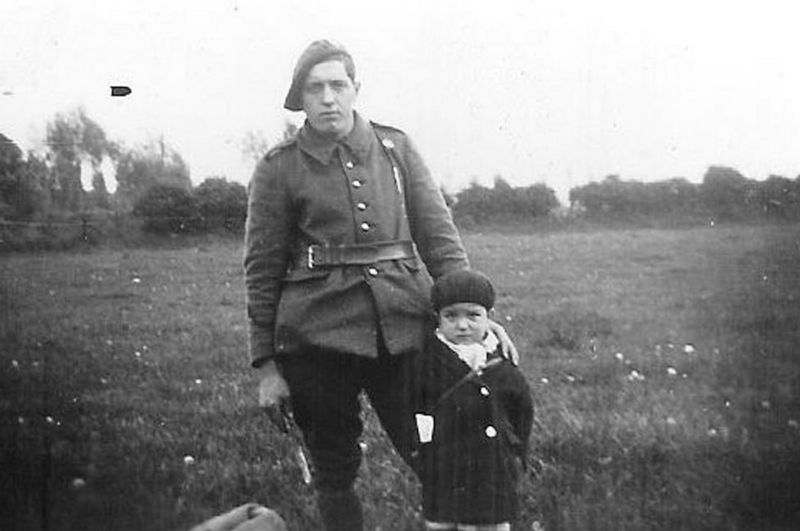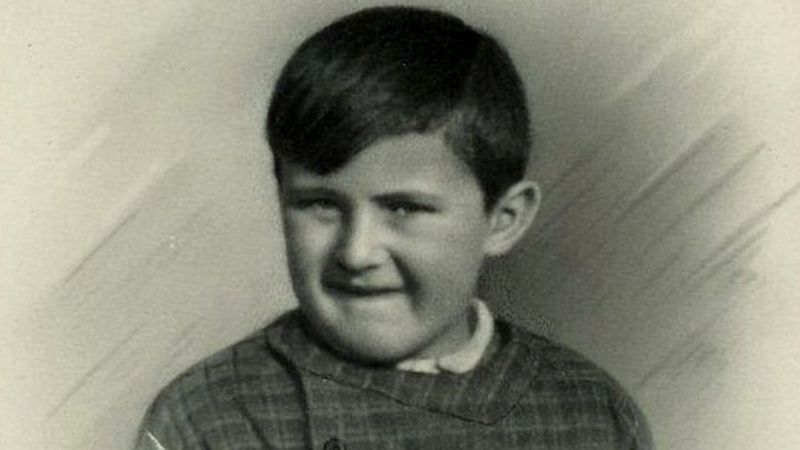France honours six-year-old WW2 Resistance agent
The youngest hero of the French Resistance was just six years old - and finally the name Marcel Pinte has been inscribed on a memorial alongside those of other anti-Nazi fighters.
The boy, who carried messages for the Resistance, died tragically in August 1944, when one of the guerrillas' Sten guns went off by accident.
He was honoured on Armistice Day at a ceremony in Aixe-sur-Vienne, near the city of Limoges in central France.
His father was a Resistance leader.
Eugène Pinte, alias Athos, ran a Resistance network from the remote family farmhouse in La Gaubertie, a hamlet in the Aixe-sur-Vienne area.
The boy was a liaison agent, carrying secret messages and letters to surrounding farms.
"With his school satchel on his back he didn't raise suspicions," said Marc Pinte, grandson of Marcel's father Eugène.
Marcel surprised people with his "astonishing" memory and was trusted to deliver messages to Resistance chiefs, which he hid under his shirt. "He understood everything at once," Marc Pinte told the AFP news agency.
He said Marcel was happy to spend time in the woods with Resistance fighters, known as maquisards, learning about their clandestine methods.
Eugène, his wife Paule and their five children hosted clandestine farmhouse meetings with Resistance fighters and even hid a British paratrooper in the loft, so it was a hive of activity at night.
Another relative, Alexandre Brémaud, spent years researching Marcel's story, because the official records focused on the Resistance fighters and sabotage operations, rather than on the many helpers - often women and children - who also took risks to defeat the Nazi occupation.
Mr Brémaud told the BBC: "My grandmother described him as an extremely happy, intelligent and brilliant brother, sparkling with mischief".
Marcel was eager to play his part in the struggle against Nazi Germany - and he became an agent nicknamed "Quinquin", or "the little kid".
Mr Brémaud described how the boy would laugh as the clandestine radio operator, working from the family dining room, would pretend to swallow the cyanide pill he carried.
The farmhouse was "a hidden place and very difficult to access," and the guerrillas found it "practical and discreet", Mr Brémaud told AFP.
Marcel's role was eventually recognised by the French state. In 1950 he was posthumously awarded the rank of sergeant of the Resistance.
How did Marcel die?
As the Allies pushed down into France from their Normandy beach-head in the summer of 1944 the Resistance stepped up their operations against the Germans.
One night Marcel went with a group of maquisards to a parachute drop of munitions and other supplies. They had received a code message via the BBC: "The forget-me-not is my favourite flower."
The rendezvous was at La Gaubertie and suddenly, as they were waiting, one of the men's Sten guns went off by accident, killing Marcel with several bullets.
His death certificate was faked to keep the unit's existence secret.
Mr Brémaud says the British paid homage to Marcel by using black canvas parachutes in their next supply drop.
It was a note found by Mr Brémaud in the military archives in Vincennes which told Marcel's story, written by a French army officer. The wartime exploits of Marcel's father Eugène were already well known.
Marcel was buried in August 1944, just hours before the liberation of Limoges, "in the presence of numerous battalions - the coffin was covered with the tricolour flag," said Marc Pinte.
Eugène died in 1951, aged 49, and was buried next to his son in Aixe-sur-Vienne.
https://www.bbc.com/news/world-europe-54919375






Post a Comment